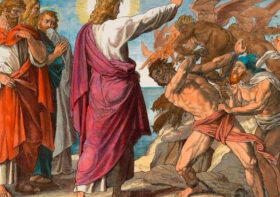Will the Real God Please Stand Up? Part II

Who you define as God and who I define as God maybe two different entities. I decided to find out just who God is to whoever you might be. This second group is included with Pantheism that I list with Buddhism, New Age, and Hinduism. Part I is here.
Pantheism
View that the Universe (Nature) and God are identical. Pantheists thus do not believe in a personal, anthropomorphic or creator god. The word derives from the Ancient Greek: πᾶν (pan) meaning “all” and θεός (theos) meaning “God”. As such, Pantheism denotes the idea that “God” is best seen as a way of relating to the Universe. http://en.wikipedia.org/wiki/Pantheism
Pantheism is a metaphysical and religious position. Broadly defined it is the view that (1) “God is everything and everything is God … the world is either identical with God or in some way a self-expression of his nature” (Owen 1971: 74). Similarly, it is the view that (2) everything that exists constitutes a “unity” and this all-inclusive unity is in some sense divine (MacIntyre 1967: 34). A slightly more specific definition is given by Owen (1971: 65) who says (3) “‘Pantheism’ … signifies the belief that every existing entity is, only one Being; and that all other forms of reality are either modes (or appearances) of it or identical with it.” (http://plato.stanford.edu/entries/pantheism/)
Buddhism
The Buddhist world view is basically monistic. That is, the existence of a personal creator and Lord is denied. The world operates by natural power and law. Buddhism denies the existence of a personal God.(pg 320 Handbook of Today’s Religions)
The refutation of the notion of a supreme God or a prime mover is seen as a key distinction between Buddhism and other religions. In, Buddhism the sole aim is spiritual practice is the complete alleviation of stress in samsara, called nirvana. The Buddha explicitly rejects a creator, denies endorsing any views on creation and states that questions on the origin of the world are worthless. Some theists beginning Buddhist meditation believe that the notion of divinity is not incompatible with Buddhism, but belief in a Supreme God is eminently considered to pose a hindrance to the attainment of nirvana,the highest goal of Buddhist practice. http://en.wikipedia.org/wiki/God_in_Buddhism
New Age
The New Age God is the divine energy that flows within and beneath all things (pg 164 The Compact Guide to World Religions)
New Agers say, “God is us and we are God”, and Jesus was just one of a “line of spiritual teachers” that continues today. (pg 159 So What’s the Difference?)
No personal God at all; just a cosmic force, a fragment of which is in us; therefore we are gods. There is often a male/female polarity in this “force” (yin-yang). Jesus: a man who evolved into an Ascended Master (godlike being) through occult and metaphysical disciplines. (pg 182 Fast Facts on False Teachings)
Hinduism
Gandhi said, “ I do not take as literally true the text that Jesus is the only begotten son of god. God cannot be the exclusive Father and I cannot ascribe exclusive divinity to Jesus. He is as divine as Krishna or Rama or Mohammed or Zoroaster”. (pg 97 The Compact Guide to World Religions)
They believe that Jesus is not God but just one of many incarnations, or avatars, of Vishnu. (pg 97 So What’s the Difference?)
“Yoga” means “yoke or union with God” (the Hindu concept of God as the Impersonal All). (pg 91 Fast Facts on False Teachings)
In Hinduism, not only are we One with the universe, but this universe called God is in reality an empty void which is fully impersonal. (pg 93 Fast Facts on False Teachings)
On the subject of God, Hinduism’s supreme being is the indefinable, impersonal Brahman, a philosophical absolute. (pg 292 Handbook of Today’s Religions)


